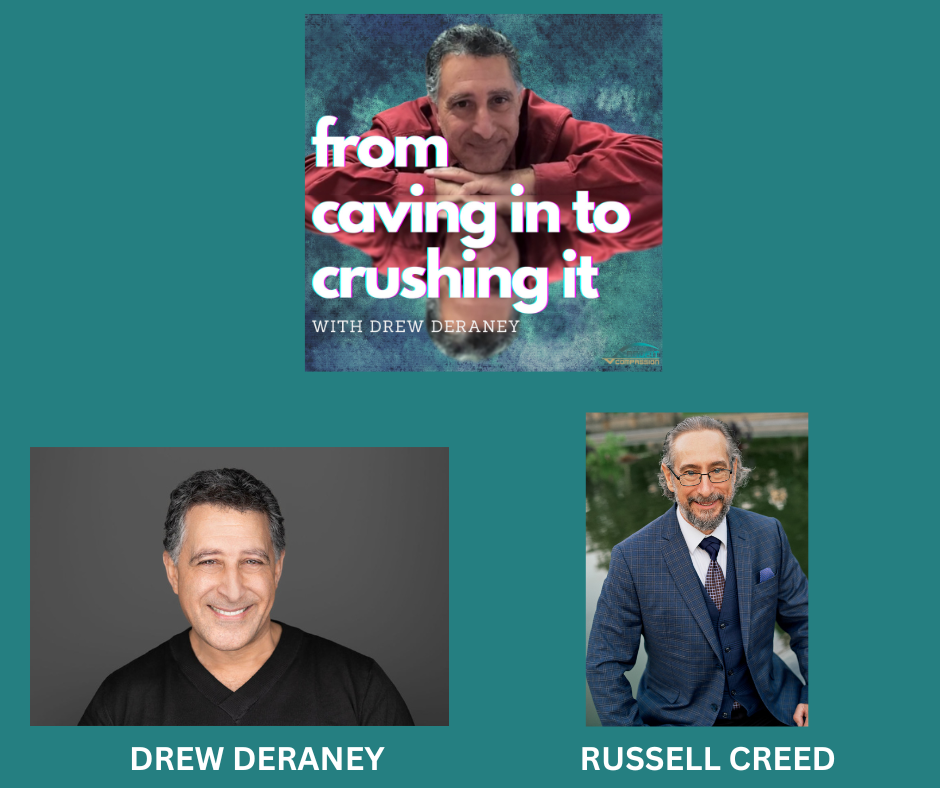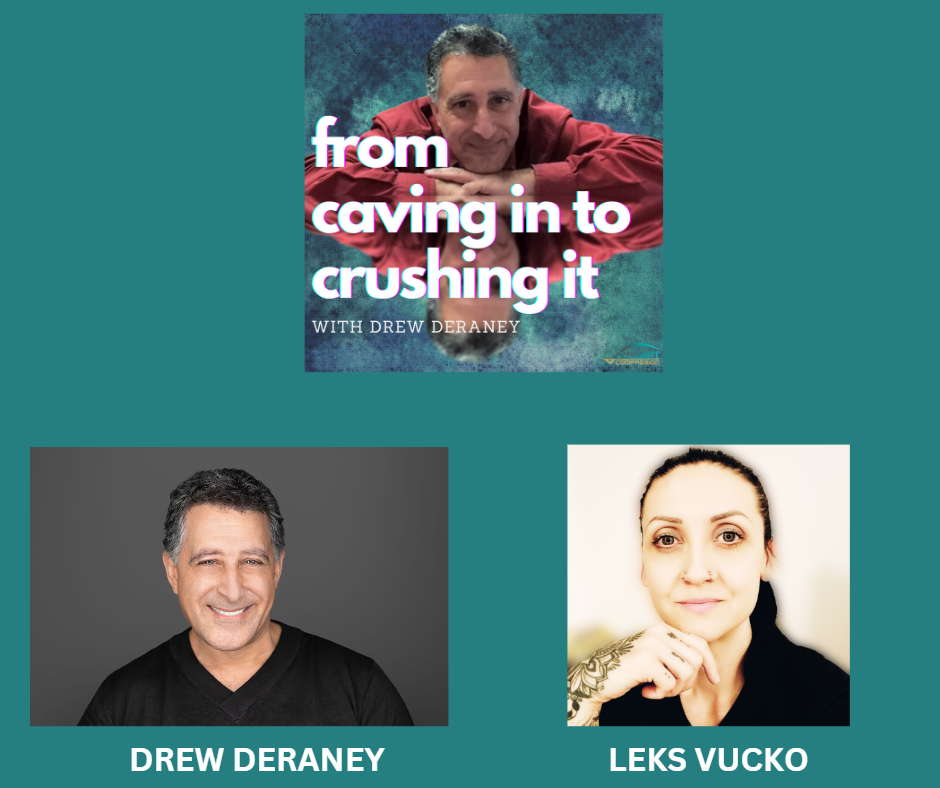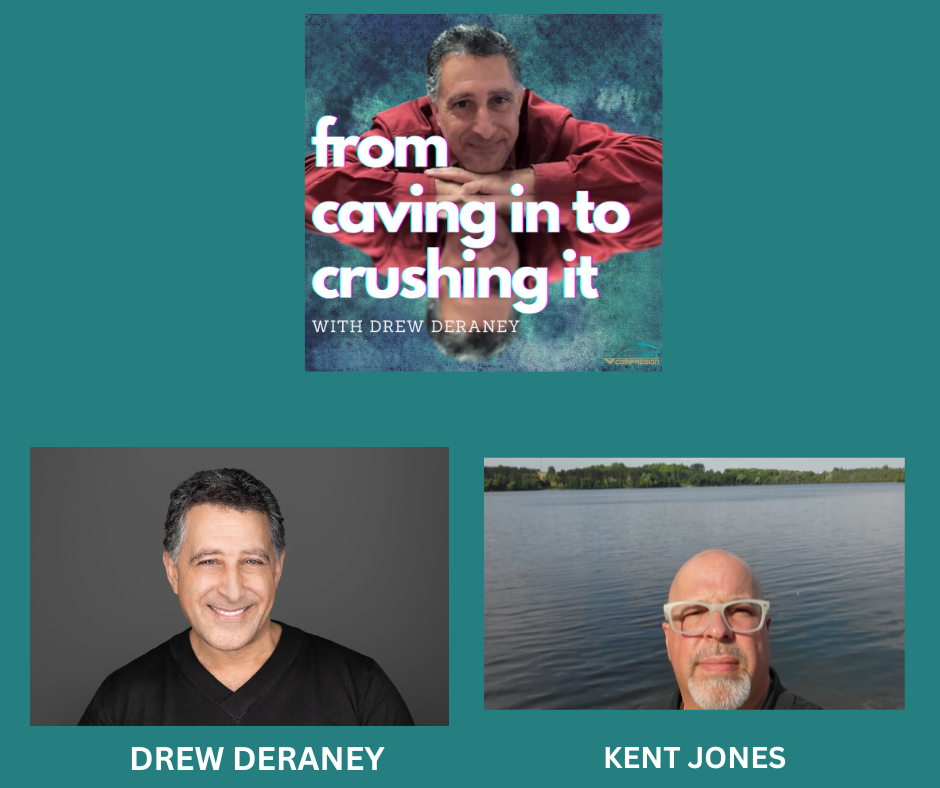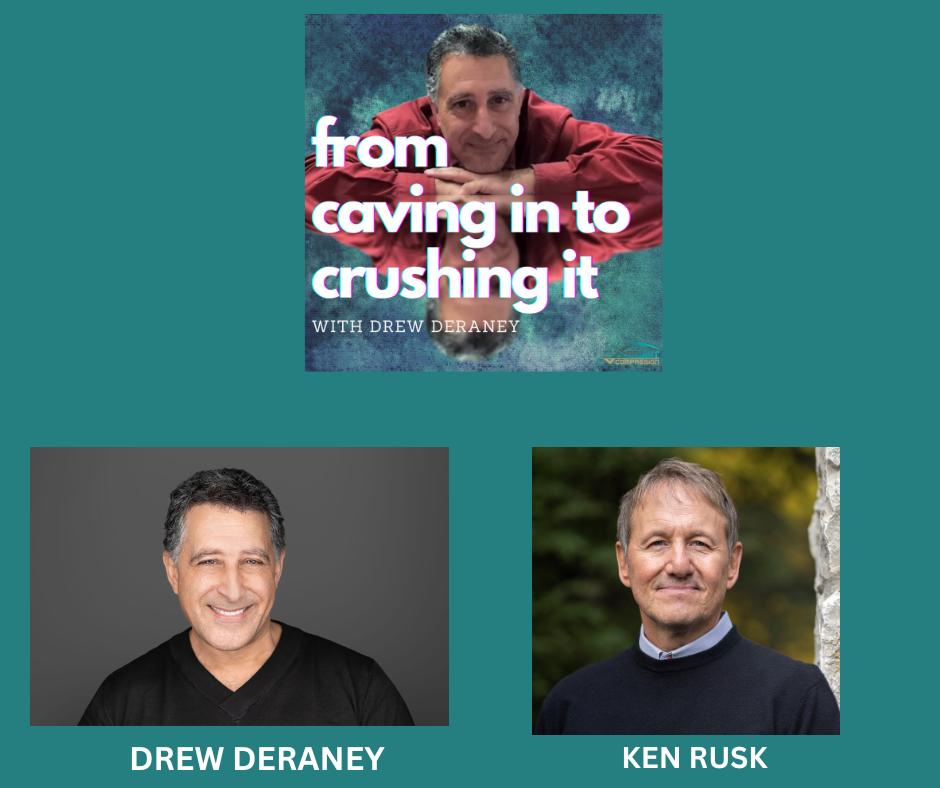[00:00:06] Speaker A: Welcome to from caving in to crushing. It the podcast for those who find themselves immersed in adversity and choose to write their story instead of having others write it for them. I'm Drew Deraney, and I'm your host, Russell. So good to have you here, my friend.
[00:00:24] Speaker B: Drew, it's a pleasure. I'm glad to be here with yeah.
[00:00:28] Speaker A: So I always like the few minutes we have before I hit the record button. And so at some point, we are going to get to let you talk a little about your two week venture to it was India, you said, right?
[00:00:40] Speaker B: Yes, that's going to be all over India.
[00:00:43] Speaker A: All right. So we will get to that. So everybody that'll be some anticipation there. So, Russell, I wanted you on because you have a wonderful story. And we all know that life is not linear when we're young. We're told it is, here's what we're supposed to do. And we go these steps and you do all the right things and life is great. We all know things happen. And I really want people to get the essence of who you are and how you got to be who you are now and what you're doing now professionally, and you as a human being. So if you could reach back as far as you desire and find that one moment and as I define I characterize it as when the two X four hit you upside the head and you realize there's a better way to live if you could tell us that story and bring us through your journey.
[00:01:39] Speaker B: Yeah, I'll be happy to tell you that story. And I will say it wasn't like a two x four hitting me upside the head with a defining moment. My story was more of a long slog through some quicksand. And you'll understand why when I get there.
[00:01:52] Speaker A: Sure.
[00:01:53] Speaker B: But I want to take you back because like many other, especially men in life, I was that guy who was doing all the things that you thought would lead to success and fulfillment. I was the chief actuary for a Fortune 500 subsidiary at the time, was the number one job in America. So I'm living the American dream. Big white house on the hill, beautiful wife, five children, and this is where I was at. Kind of the height of my professional career becoming an actuary, which is a long, tedious process in itself.
[00:02:33] Speaker A: How old were you at that time? Just to give a framework?
[00:02:37] Speaker B: Yeah, so I was in my late 30s.
[00:02:43] Speaker A: Got it. Okay.
[00:02:44] Speaker B: Late thirty s. And I was chief actuary, five kids.
A big supporter of my community. I was involved in Scouts, leading a Scout troop. I was involved in a church youth ministry leading that. So I was a contributor to my community and in my employment when I was diagnosed with a rare disease that was impacting my liver. Now, as a surprise to me, because most people, when you think of liver disease, you think, oh, well, he was drinking a lot or he was taking drugs or doing all those sort of things. And I was living a pretty clean life.
My drinking was limited to one bottle of wine every year at New Year's to celebrate with my wife, and the next year coming, that was it.
But the disease I was diagnosed with is called primary sclerosis. Colingitis. I know that's a mouthful, so we'll call it PSC from now on. PSC, wow. PSC is when your body attacks the bile ducts in your liver and it starts to collapse the bile ducts. And because of that, the bile then is forced to back up into the liver. Now, bile is very corrosive. It's what we squirt into our stomach to help us digest the food and all that stuff. So when it's backing up in your liver, it starts to corrode your liver. So here I am, 39, diagnosed with primary sclerosis and colingitis PSC, and I basically had the liver of an 80 year old alcoholic.
[00:04:26] Speaker A: Wow.
[00:04:29] Speaker B: So this was a total surprise to me and something that was not in that plan. You talk about life being not linear, this was obviously not in the plan. And here I am, at the height of my career, five children that I'm supporting as the sole breadwinner in the family, and I've been given basically, a death sentence. There is no cure for PSC.
It's a disease that robs you of your strength. It robs you of just if you've I like to use this example for people who understand cars. The liver is the fuel filter for the body. And when your fuel filter gets clogged up in your car, what happens? It just has no get up and go. It doesn't want to move. Right. No matter how hard you push on the gas pedal, it just putters. And that's what I was like. I was living kind of like a zombie for nearly six years.
As soon as I was diagnosed, I was put on the liver transplant list.
But that is an entire journey in itself in becoming the recipient and becoming the sickest person in your region to be eligible for it. So here I am, Fortune 500, sea level career, job managing that trying to support my family while also living with this disease that was robbing me of my strength and my vitality, also left me constantly. Itchy one of the things they talk about PSC, is that one of the defining characteristics is that you itch all the time. So if you've ever had poison ivy, imagine that all over your body all the time.
[00:06:21] Speaker A: Wow.
[00:06:22] Speaker B: It's a horrible feeling.
So that was my existence for six years, slowly getting weaker and weaker and it comes and goes. It's one of these invisible diseases, so people don't necessarily notice you have it.
And so there would be times when I would have more energy, but I was the guy who was taking our family out every weekend, doing things, running the show.
[00:06:49] Speaker A: Right.
[00:06:49] Speaker B: And I had to step back a lot and become let go of all those things that I was trying to drive.
And so, thankfully, as you can tell, I did receive a liver transplant. That's why I'm here. And you would think that would be the two x four, but the two x four was really the time afterwards in my recovery.
[00:07:17] Speaker A: Okay.
[00:07:18] Speaker B: Because I had a great attitude at first and was doing all the things, and I was recovering quickly.
And it's when I started going back to the same life that I had built before okay.
And going into that same routine and recognizing that I just went through this crucible of a crisis, and I don't really like what I've created in life. Interesting, while I had had the number one job, I was pursuing that because that's what I thought I should be doing, right? Not because it's what I wanted to do. It was the best way to provide for my family. My relationships, I realized, were not very fulfilling or all surface level. And while I was contributing to my community, I really didn't have anyone that I considered as a close friend or confident.
[00:08:11] Speaker A: Okay.
[00:08:12] Speaker B: I often joked my wife was my best friend.
[00:08:16] Speaker A: Right.
[00:08:16] Speaker B: And the reality was, my wife was my only real friend.
[00:08:19] Speaker A: Only real friend. Yes.
[00:08:21] Speaker B: And so I did not have others that I could turn to and to really share life with.
And it was in that moment of recognizing that I did not have a life that I enjoyed and that I had just gone through all this turmoil and crisis to come back to this. And I'm like, really? Did I really even make it? Maybe this is not maybe I didn't survive and this is what the proverbial hell looks like, right? This is the place I felt. And I began to spiral into a very dark place.
[00:09:03] Speaker A: Oh, boy.
[00:09:04] Speaker B: I hated life.
I hated my wife because I was blaming her for all these things and being trapped in the situation that I found myself in.
And because of that, I started to lash out and to create a lot of turmoil in our lives.
The thing that really became a turning point for me was I was one night sitting through and scrolling through Facebook like most people do, or trying to check, just wasting time. I hit upon a Facebook ad for men in their 40s that were worried about losing their health and not being around for their family. Sure. I'm like, wow, man, I almost went through that and I saw myself walking down that same path again, right?
[00:09:59] Speaker A: Absolutely.
[00:10:00] Speaker B: And I'm like, I can't do that. That's not going to happen. So I clicked on it, and it was this program called fitfather project.
Dr. Anthony Balduzi runs it. He's an awesome dude. If you're struggling with some health and that area. I would highly recommend this program.
But the thing that was transformational for me is, like, I knew I was going to have to do some exercise and watch what I eat.
Here's the big secret. The only way to lose weight is to watch what you eat and move more. That's how it works.
But part of his program is like, if you want to do this well and do it to the best you can, you need to do this little section beforehand. Now, being the achiever that I am, I'm like, all right, if you got to do it, I'm going to do it, because I'm all in. I'm doing everything.
[00:10:58] Speaker A: Sure.
[00:10:59] Speaker B: And what it was about was starting to set up some routines in your life that were helpful and creating a vision for your life, particularly around the health, which is where he started. And so I remember I was encouraged to write a vision statement and then email it to him, and he would give you some feedback on it. And my very first vision statement was about something like, I'm lean, strong, and energetic, and I inspire others around me to live a healthy life.
[00:11:29] Speaker A: Okay.
[00:11:30] Speaker B: Something of that nature.
[00:11:32] Speaker A: Yeah.
[00:11:32] Speaker B: Right.
He's like, oh, that's great. So every morning, I would look at that statement, and I would write it down, and I'd do some reading and some other things before I exercised and planned my meals and all those things.
And it was somewhere in there that I recognized that life is not really about answering the question, who am I?
[00:12:01] Speaker A: Okay.
[00:12:02] Speaker B: A lot of guys, we struggle with.
[00:12:04] Speaker A: That at some point.
[00:12:04] Speaker B: Absolutely. I was struggling with that afterwards.
[00:12:07] Speaker A: Right.
[00:12:11] Speaker B: The more powerful question is, who do I want to be?
[00:12:14] Speaker A: True.
[00:12:15] Speaker B: Right. And so that became a catalyst for me to start to answer that question every morning, and I started to write more what I call my I am statements.
[00:12:24] Speaker A: I am I love that.
[00:12:26] Speaker B: Who am I?
And that expanded. And every morning, I would sit down and write this who am I? And that I am became really a document that guided me for the next several years about the person I was stepping into and becoming.
[00:12:42] Speaker A: Was it a challenge for you to differentiate between who you are versus who you want to be, or was it easy, really, when you really realized who you wanted to be?
[00:12:52] Speaker B: I believe I was given a golden opportunity because there was no expectation after going through that huge crisis that I went through.
[00:13:01] Speaker A: Sure.
[00:13:01] Speaker B: Most people, there was no expectation for me to be the person I was before.
[00:13:06] Speaker A: Got it.
[00:13:07] Speaker B: So I think I was given a hall pass.
So for me, yeah, it was an opportunity to say, it's a clean slate.
[00:13:15] Speaker A: I love it. Okay.
[00:13:16] Speaker B: There is no expectation. Who do I want to be?
[00:13:19] Speaker A: And you hit on something here, Russell, though, because we all, each one of us, have the opportunity of a clean slate because we control it. Today starts now. So thank you for mentioning that. So you got that clean?
Yeah, yeah.
[00:13:35] Speaker B: And I started meditating on that every morning, essentially rewriting and writing more and writing more, and many things came out of that. Like, I'm an and I'm an infuser. I inspire other people with my story. That became part of that, and it really became the driving force of who I am today.
One other aspect that I think you will also appreciate, that was part of Dr. Anthony Balduzi's criteria for that true success was every day, write three things down that you're grateful for.
[00:14:12] Speaker A: I love that. Absolutely.
[00:14:14] Speaker B: Yeah. And that was the thing I struggled with in the beginning, because I hated life, I hated my wife. I was in this really dark spot. And so every day, the first thing I would write is, I'm grateful to be alive.
[00:14:29] Speaker A: Okay. There you go.
[00:14:31] Speaker B: Even though I didn't feel it, I didn't really and I would struggle to find a couple of other things that I was grateful for.
[00:14:39] Speaker A: Wow, okay.
[00:14:41] Speaker B: But I stuck to it. Right. It became a discipline. It became a practice. And every morning, I would get up, I would write the three things I was grateful for. I'm grateful to be alive. I'm grateful for the bird chirping outside the window. Right. I'm grateful for something. I'd find it.
[00:15:01] Speaker A: Absolutely.
[00:15:02] Speaker B: And then I'd write my IMS.
And it was that practice day after day after day for I think I consistently did that for six months, day after day. And my IMS became a three to four page document that I would write out every single day.
[00:15:18] Speaker A: Sure.
[00:15:19] Speaker B: And what I've learned, looking back on that is what I was really doing is that I was rewiring my brain.
I was rewriting the program that I was operating under.
[00:15:31] Speaker A: Absolutely.
[00:15:32] Speaker B: And at the time, I had no idea that's what was going on.
But in hindsight, now I recognize that.
[00:15:40] Speaker A: That is it is powerful. And I'm going through that now last seven years, rewiring my brain. And we want the audience to know, both Russell and I want you to know that you all control your reality, and you've got to believe that it starts from within, and we all have that capability of creating our reality, and it starts right.
So so, Russell, thank you for getting us to this point. So what are you doing now with all this power? And I'm going to call it power. You're releasing this power, and you're sharing it with the world. What are you doing now with this newfound power?
[00:16:22] Speaker B: Yeah. So one of the things I'm really focused on is helping professional, career driven men that have followed that path of success and found it unfulfilling to find that fulfillment.
Many of us do that. We're chasing the things in life and the success in life, and we forget that really what is important is not what we get in life, but who we become in life. And it's through the becoming that the things we want show up. And so I really help men reconnect with who they are, reconnect with other men, and so that they can live a life of success with fulfillment. A couple of ways I do that. One is I run a program called Master Your Fate program, which really teaches men how to master their minds, master their emotions, and really what the six true principles of success are that lead to fulfillment. I call those the power principles, and one of those is the power of gratitude.
Yeah. So that's one of the things I do. I lead men through that. I also help men connect.
I run a Facebook group called Unconquerable Men, and I have organized local events so that men can connect together. I believe it's so important for us to be in community with other men.
[00:17:50] Speaker A: Absolutely.
[00:17:51] Speaker B: And that's part of what society has kind of taken away from us as we industrialize that we push men into cubicles and offices and all these spaces and kept them isolated to their families and their work.
[00:18:06] Speaker A: Absolutely.
[00:18:07] Speaker B: And we've lost that connection with a tribe. So I help try to foster and facilitate that.
[00:18:12] Speaker A: That's wonderful. And you're right. There's been forced isolation on men. And a lot of stuff I've been reading about, men don't have close friends and they're lonely. And we've kind of created it for ourselves because we've listened to the outside voices and we've put us in a box.
[00:18:32] Speaker B: Correct.
[00:18:33] Speaker A: Yeah. That's powerful, I think. Touch on one thing before I ask you the last couple of questions, and we talk about connection. And you mentioned a few times about when you were in that dark space, a dark place, you hated your wife. How has that evolved through your change? How is your relationship with her now?
[00:18:54] Speaker B: Yeah.
Being completely vulnerable. We still have challenges because of how I showed up in that time frame.
And there are moments when it's great because I'm no longer leaning entirely upon her as my emotional support, as my only support in the world. And so I regularly get out and meet with others. That helps me stand up and be who I am and be confident in who I am. I'm much more clear on who I want to be and how I want to show up in the world. And I'm no longer looking to her for my own acceptance, which is what was happening before.
[00:19:39] Speaker A: Absolutely.
And kudos to you and to her. She stayed with you.
[00:19:45] Speaker B: Yes.
[00:19:46] Speaker A: Stayed with you. So marriage is a work in progress. Just like we all each individual, we're a work in progress. So I commend you two for that, for sticking it out.
Couple last questions before we give people the opportunity to be able to connect with you. I want to ask you I'm going to tell you, you have the opportunity to sit down with young Russell, seven to ten years old, and you want to give young Russell advice on life. What are you going to tell him?
[00:20:21] Speaker B: Yeah, what I'm going to tell young Russell is it's okay to pursue the things you want and to live your life.
It's okay. You don't have to do what everyone tells you to do. You don't have to please everyone else.
[00:20:40] Speaker A: Love that. All right, so now you're putting a different hat on, and you're now sitting with young Russell, the young businessman, young entrepreneur, ready to take on the world professionally. What business advice are you going to give young Russell?
[00:20:56] Speaker B: Yeah, my business advice is to not be afraid to go ahead and try things, because action is the biggest factor that actually creates success.
Moving forward, constantly trying, constantly taking action is the key.
[00:21:17] Speaker A: Love that. Absolutely love that. So, Russell, I definitely have captured the essence of Russell Creed, and I'm sure the audience wants more because they now have captured the essence of you. Please tell them how they can reach you.
[00:21:34] Speaker B: Yeah, there's a number of ways you could reach me. You can reach me through my website, which is the invictuslife.com. Invictus is I-N-V-I-C-T-U-S. So theinvictuslife.com or you can find me on the socials right. I'm on LinkedIn, I'm on Facebook, I'm on Instagram. You can find me as Russell Creed in those places. And if you're a man who's looking for some connection, come join the Unconquerable Man group. We'd love to have you.
[00:22:06] Speaker A: Wonderful. Well, Russell, I have to say, we talked about gratitude. I am grateful you're in my life and that we're friends, and it's just amazing to see people like you doing things that you do. And please keep doing what you're doing because you are helping so many people.
[00:22:24] Speaker B: Thank you. And I'm grateful for you, Drew, and grateful for this chance to share my story. I appreciate that.
[00:22:29] Speaker A: Absolutely. And thank you, Russell. It's my pleasure. So everybody be well out there and take care of yourselves.
Thanks so much for listening. If you enjoyed the episode, please subscribe and give us a review to help others find it. If you find yourself immersed in adversity and would like to find support from other men in times of struggle, please become a member of my Men's Supporting Men Collab Liberation Tribe by emailing me at
[email protected] expressing your interest, and I'll get in touch with you. Speak to you soon.




